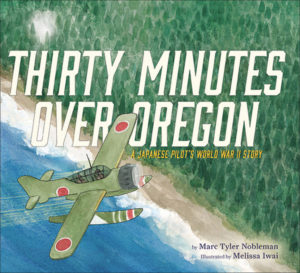Thirty Minutes Over Oregon: A Japanese Pilot’s World War II Story
Reviewed by Margaret Crompton
December 1, 2019
 By Marc Tyler Nobleman, illustrated by Melissa Iwai. Clarion Books, 2018. 40 pages. $17.99/hardcover; $12.99/eBook. Recommended for ages 6–9.
By Marc Tyler Nobleman, illustrated by Melissa Iwai. Clarion Books, 2018. 40 pages. $17.99/hardcover; $12.99/eBook. Recommended for ages 6–9.
“What a stupid war we made.” So said Nobuo Fujita about the Second World War.
As reviewer of this book, I am writing this soon after the ceremonies commemorating the seventy-fifth anniversary of the D-Day landings on the Normandy beaches on June 6, 1944. I was three years old. My father was in the British Army but not involved in D-Day. My whole life has been affected by his absence, by that war. The June 7, 2019 Guardian newspaper includes a letter about a man who was there—aged 18—and was later “sunk twice in the Mediterranean and had to swim for numerous hours in an oily, highly flammable sea in the darkness of a pitch-black night.” Eventually, he “had to sell all he owned to pay for his nursing home.” His son regards the D-Day tributes by “‘royalty’ and politicians” as “hypocrisy” (John Marshall letter, June 7, 2019).
In contrast, this book tells the story of Nobuo Fujita’s post-war mission to promote peace which exemplifies honesty and humility. Nobuo was a Japanese pilot who had been ordered to drop bombs into the forest near Brookings, a small Oregon town. Only one bomb exploded, and the fire it started was soon extinguished. The second attempt also fizzled out. When bomb fragments were found, local people realized there had been a Japanese attack. This was in 1942.
Twenty years later, the Brookings Jaycees (JCI, Junior Chamber International) decided to invite the Japanese pilot to their annual Memorial Day festival. Although the plan to honor someone who had been an enemy attracted opposition, the Jaycees determined that this visit “would be a symbol of reconciliation not just between individuals but between nations.” They were supported by World War II veterans. One wrote, “He was doing a job and we were doing a job.” Objectors “began to open their minds.” The Fujita family accepted the invitation. And when students from Brookings-Harbor High School visited Japan, Nobuo said, “The war is finally over for me.”
I have spent a long time with this book. The text is clear and concise. The illustrations are generous, lively, with the perfect approach for this story, which is essentially about making peace. The narrative is easy to follow, and can lead to questions and reflection, especially about feelings and responses. Look for the samurai sword, the submarine, and the redwood sapling planted on the fiftieth anniversary of the bombing.
When the young Friends book review editor offers me a book, I usually choose a subject about which I know the least, and which seems most unusual. Encountering Nobuo and the Jaycees has opened my mind. I am glad to have reviewed this book, which I may not have seen otherwise.
Nobuo directed thousands of dollars to the town library to be spent on children’s books that celebrate other cultures. His own story is worthy of inclusion in any library, personal or public. What a wise book it has made.



Comments on Friendsjournal.org may be used in the Forum of the print magazine and may be edited for length and clarity.